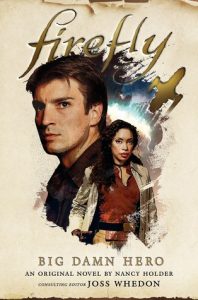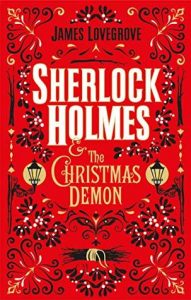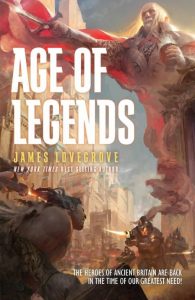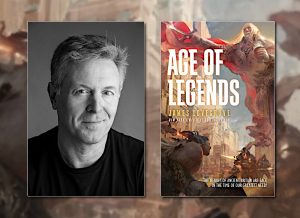Author Spotlight: JAMES LOVEGROVE
James Lovegrove is the author of nearly 60 books, including The Hope, Days, Untied Kingdom, Provender Gleed, the New York Times bestselling Pantheon series, the Redlaw novels and the Dev Harmer Missions. He has produced five Sherlock Holmes novels and a Conan Doyle/Lovecraft mashup trilogy, The Cthulhu Casebooks. He has also written tie-in novels for the TV show Firefly.
James has sold well over 50 short stories and published two collections, Imagined Slights and Diversifications. He has produced a dozen short books for readers with reading difficulties, and a four-volume fantasy saga for teenagers, The Clouded World, under the pseudonym Jay Amory.
James has been shortlisted for numerous awards, including the Arthur C. Clarke Award, the John W. Campbell Memorial Award, the Bram Stoker Award, the British Fantasy Society Award and the Manchester Book Award. His short story “Carry The Moon In My Pocket” won the 2011 Seiun Award in Japan for Best Translated Short Story. His work has been translated into fifteen languages, and his journalism has appeared in periodicals as diverse as Literary Review, Interzone, BBC MindGames, All About History and Comic Heroes.
He contributes a regular fiction-review column to the Financial Times and lives with his wife, two sons and tiny dog in Eastbourne, not far from the site of the “small farm upon the South Downs” to which Sherlock Holmes retired.
Welcome to the Hive, James. Let’s start small: tell us about a great book you’ve read recently!
The Andromeda Evolution by Daniel H. Wilson is a sequel to Michael Crichton’s The Andromeda Strain. Set fifty years after the events of the original, which itself came out fifty years ago, Wilson’s book surprised me by being not only a worthy follow-up to an SF classic but an entertaining page-turner that tackles a fair few heavy science concepts.
Okay, time to escalate things: reality warps and you suddenly find yourself leading a D&D-style party through a monster-infested dungeon. What character class are you, and what’s your weapon of choice?
I’m going to bow out of this one. I haven’t played D&D since I was ten. I love tabletop gaming but I find roleplaying a little hard to handle. I think, in the past, I always took on the “tank” barbarian role and liked to kill my enemies with a broadsword, but that was because I was massively into the Conan books back then.
 When you’re not trawling through dungeons, how do you like to work? (In silence, with music, or serenaded by the damned souls of a thousand dead shrimps? Do you prefer to type or to hand-write? Are you an architect or a gardener? A plotter or a pantser? D’you write in your underwear, or in a deep-sea diver’s suit?) Tell us a little bit about your writing method!
When you’re not trawling through dungeons, how do you like to work? (In silence, with music, or serenaded by the damned souls of a thousand dead shrimps? Do you prefer to type or to hand-write? Are you an architect or a gardener? A plotter or a pantser? D’you write in your underwear, or in a deep-sea diver’s suit?) Tell us a little bit about your writing method!
I prefer silence. If music’s on, I tend to sing along, which nobody wants to hear and which is not conducive to focused work. Because I like to be at my desk first thing in the morning, I have been known to write in my pyjamas, but most days I try to be dressed, otherwise I feel uncivilised. A mug of coffee to hand, my Yorkshire terrier curled up in her basket under my desk, and I’m ready to rock! When it comes to plotting, I used to be an unrepentant pantser. Nowadays, though, I tend to plot quite strictly, with my outlines going through several drafts, especially when it comes to my Sherlock Holmes pastiches. You just can’t wing it when you’re writing a murder mystery.
What (or who) are your most significant fantasy influences? Are there any creators whom you dream of working with someday?
I suppose Stephen King, Alan Moore and Ray Bradbury are my principle influences, since I devoured everything I could find by them at an early age. As far as collaborating with creators, right now I’m working on something with one of the premier comics writer-artists of our times. I can’t say any more about the project at present but it’s tremendously exciting for me.
What was the last thing you watched on TV and why did you choose to watch it? Alternatively, what games have you enjoyed recently?
I’m enjoying Watchmen hugely. I had my doubts when it was announced, but the show has blown me away. It succeeds both in its own right, as a study of vigilantism and extremism, but also as a plausible extrapolation of the original work. If I were Alan Moore – which I will never be because I do not have the mad beard-growing skillz – I would be very pleased with what the show’s creators have achieved.
 The world shifts, and you find yourself with an extra day on your hands during which you’re not allowed to write. How do you choose to spend the day?
The world shifts, and you find yourself with an extra day on your hands during which you’re not allowed to write. How do you choose to spend the day?
I’d probably think to myself, “At last, a full day in which I can plonk myself down on my backside and read an entire book in one sitting.” Or, alternatively, watch an entire TV box set in one sitting.
Can you tell us a little something about your current work(s) in progress?
I’m halfway through my fourth Firefly novel. I’ve loved writing tie-in fiction for my favourite-ever TV show, and in this book I am really putting the crew of Serenity through the wringer as they infiltrate a snowbound prison planet in order to… Well, I’m not at liberty to divulge any more plot details than that.
What’s the most (and/or least) helpful piece of writing advice you’ve ever received?
I don’t think I’ve ever received any direct advice from anyone. The advice I give other people, if they ask, is just to stop prevaricating, get on and write the damn thing. And read lots too. That’s important. You can’t write if you don’t love to read.
 Every writer encounters stumbling blocks, be it a difficult chapter, challenging subject matter or just starting a new project. How do you motivate yourself on days when you don’t want to write?
Every writer encounters stumbling blocks, be it a difficult chapter, challenging subject matter or just starting a new project. How do you motivate yourself on days when you don’t want to write?
This is rarely a problem for me, but usually if something doesn’t seem to be working I’ll take the dog out for a walk on the hills and just think. Once I get a pace going, my thoughts start to freewheel and my back-brain offers up the answer to the problem. An equally valid method is to sleep on it. During the night, my subconscious will be churning and, come the morning, I’ll know what needs to be done.
If you could visit any country at any point in history, where/when would you go, and why?
I loved the Ancient Greek myths as a kid, so I suppose Classical-era Athens would be the place to go. It was the hub of Mediterranean civilisation in its heyday and I like to think of it as clean, exciting and filled with storytellers and philosophers – although I’m probably wrong.
Tell us about a book that’s excellent, but underappreciated or obscure.
Any of mine, ha ha.
Finally, would you be so kind as to dazzle us with an elevator pitch? Why should readers check out your work?
Age of Legends is the eighth and last novel in my Pantheon series and takes place in a divided United Kingdom that’s toiling under a repressive far-right government. Characters from British myth come to life, incarnating in the bodies of various misfits and marginalised people who rise up to save the country from disaster.
Thanks again for joining us, James, and good luck with your latest release!
James Lovegrove is the author of the Cthulhu Casebooks, the Pantheon series, and several Firefly tie-in novels. His latest release, AGE OF LEGENDS, is available now.


Great interview! James is definitely one of those guys who should be more of a household name. I still remember the experience of encountering him for the first time in The Age of Ra and just being blown away.
Thanks Bob! When I saw his bibliography, I was amazed I’d never heard of him myself. He’s so prolific!